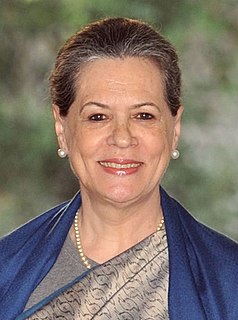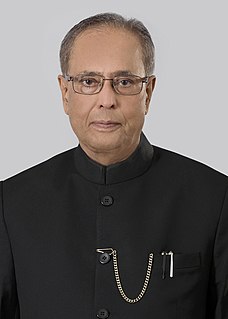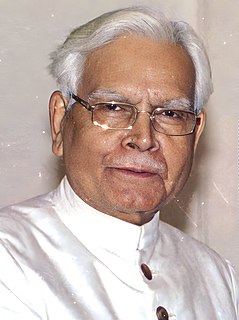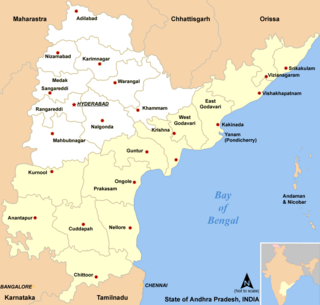Related Research Articles

The prime minister of India is the de facto head of the government of India. The prime minister is the presiding member of the Council of Ministers of the central government. They can be a member of any of the two houses of the Parliament of India—the Lok Sabha and the Rajya Sabha. The prime minister ranks third in the order of precedence.

The Indian National Congress, colloquially the Congress Party but often simply Congress, is a political party in India with widespread roots. Founded in 1885, it was the first modern nationalist movement to emerge in the British Empire in Asia and Africa. From the late 19th century, and especially after 1920, under the leadership of Mahatma Gandhi, Congress became the principal leader of the Indian independence movement. Congress led India to independence from the United Kingdom, and powerfully influenced other anti-colonial nationalist movements in the British Empire. Due to its enduring history, the Congress is often called the "grand old party".

Sonia Gandhi is an Indian politician. She is the president of the Indian National Congress, a big tent political party, which has governed India for most of its post-independence history. She took over as the party leader in 1998, seven years after the assassination of Rajiv Gandhi, her husband and a former Prime Minister of India, and remained in office until 2017 after serving for twenty-two years. She returned to the post in 2019 after her son, Rahul Gandhi, resigned.

Manmohan Singh is an Indian economist, academic, and politician who served as the 13th Prime Minister of India from 2004 to 2014. Currently, he is a Member of Parliament in the Rajya Sabha, representing the state of Rajasthan. A member of the Indian National Congress, Singh was the first Sikh Prime minister of India. Singh was also the first prime minister since Jawaharlal Nehru to be re-elected after completing a full five-year term.

Palaniappan Chidambaram is an Indian politician and former attorney who currently serves as Member of Parliament, Rajya Sabha. He recently served as the Chairman of the Parliamentary Standing Committee on Home Affairs (2017–18).

Pranab Kumar Mukherjee was an Indian politician who served as the 13th president of India from 2012 until 2017. In a political career spanning five decades, Mukherjee was a senior leader in the Indian National Congress and occupied several ministerial portfolios in the Government of India. Prior to his election as President, Mukherjee was Union Finance Minister from 2009 to 2012. He was awarded India's highest civilian honour, the Bharat Ratna, in 2019, by his successor as president, Ram Nath Kovind.

Kunwar Natwar Singh, IFS is an Indian diplomat and politician who served as the Minister of External Affairs from May 2004 to December 2005.

Arackaparambil Kurien Antony, better known as A. K. Antony is an Indian politician and attorney who was the 23rd Defence Minister of India. He is the current Member of Parliament in the Rajya Sabha, from Kerala for the fifth term since 1985. He also currently serves as the Chairman of the Disciplinary Action Committee of the All India Congress Committee, Congress Working Committee, and member of the Congress Core Group and Central Election Committee.

Jairam Ramesh is an Indian economist, historian and politician belonging to Indian National Congress. He is a Member of Parliament representing Karnataka state in the Rajya Sabha. In July 2011, Jairam was elevated to the Union Council of Ministers of India and appointed Minister of Rural Development and Minister of the new Ministry of Drinking Water and Sanitation. However, in the cabinet reshuffle in October 2012, he has been divested of the portfolio of Ministry of Drinking Water and Sanitation. He was previously the Indian Minister of State at the Ministry of Environment and Forests from May 2009 to July 2011.

Ekkadu Srinivasan Lakshmi Narasimhan is an Indian former civil servant and politician who served as the first Governor of Telangana. He assumed office of the Governor of Andhra Pradesh in December 2009 and Governor of Telangana on 2 June 2014. A retired Indian Police Service officer, he previously served as the Director of the Intelligence Bureau from February 2005 to December 2006. He also served as the Governor of Chhattisgarh from 2007 to 2009. Narasimhan served as Governor for 12 years making him the longest-serving Governor in India.

The 14th indirect presidential election, in order to elect the 13th president, was held in India on 19 July 2012. The last date for filing nominations was 30 June, whereas the votes would be counted on 22 July. The two leading candidates for the presidency were former Finance Minister Pranab Mukherjee from West Bengal and former Speaker of the Lok Sabha Purno Agitok Sangma from Meghalaya.

Samaikya Andhra Movement was a movement organized to keep the Indian state of Andhra Pradesh united, and to prevent the division of the state - separating the Telangana districts of the state into a separate Telangana state. The movement was supported by government employees, advocates in Coastal Andhra & Rayalaseema regions along with students from 14 universities, various occupational, caste & religious groups of Coastal Andhra & Rayalaseema regions. The last set of protests were triggered after the Congress Working Committee decision to divide the state came to an end after President of India gave nod to Telangana Bill which would make the latter to come into existence from 2 June 2014.

The Telangana protests 2004-2010 refers to the movements and agitations related to the Telangana movement that took place between the years 2004 and 2010. For the 2004 Assembly and Parliament elections, the Congress party and the TRS had an electoral alliance in the Telangana region to consider the demand of separate Telangana State. However, again in 2006, the then Chief Minister Y. S. Rajasekhara Reddy categorically said that the state would remain united. This again resulted in statewide protests. In 2009, Union Minister of Home Affairs P. Chidambaram announced that the Indian government would start the process of forming a separate Telangana state, pending the introduction and passage of a separation resolution in the Andhra Pradesh assembly after an 11-day fast by Kalvakuntla Chandrashekar Rao. This again resulted in protests across both Andhra and Rayalseema as in a short time of the Home Minister's declaration, MLAs from the Coastal Andhra and Rayalaseema regions submitted their resignations in protest.

Pamulaparthi Venkata Narasimha Rao was an Indian lawyer and politician who served as the 9th Prime Minister of India from 1991 to 1996. He is often referred to as the "Father of Indian Economic Reforms". His ascendancy to the prime ministership was politically significant in that he was the second holder of this office from a non-Hindi-speaking region and the first from South India. He led an important administration, overseeing a major economic transformation and several home incidents affecting national security of India. Rao, who held the Industries portfolio, was personally responsible for the dismantling of the Licence Raj, as this came under the purview of the Ministry of Commerce and Industry, reversing the economic policies of Rajiv Gandhi's government. Future prime ministers Atal Bihari Vajpayee and Manmohan Singh continued the economic reform policies pioneered by Rao's government. He employed Manmohan Singh as his Finance Minister to embark on historic economic transition. With Rao's mandate, Manmohan Singh launched India's globalisation angle of the reforms that implemented the International Monetary Fund (IMF) policies to rescue the almost bankrupt nation from economic collapse. Rao was also referred to as Chanakya for his ability to steer economic and political legislation through the parliament at a time when he headed a minority government.
The National Integration Council (NIC) is a group of senior politicians and public figures in India that looks for ways to address the problems of communalism, casteism and regionalism. Council members include cabinet ministers, entrepreneurs, celebrities, media heads, chief ministers, and opposition leaders. The 2013 council was chaired by Prime Minister Manmohan Singh, and its members included movie star Jaya Bachchan, cardinal Baselios Cleemis, news editors: Shobhana Bhartia, Siddharth Varadarajan, Aroon Purie, Barkha Dutt, political leaders; Rajnath Singh, Kumari Mayawati, Bhim Singh, Sonia Gandhi, and billionaires; Anand Mahindra, Rajashree Birla, Cyrus Mistry, and Azim Premji.

The 2012 Indian Vice-Presidential election was held on 7 August 2012 to elect the Vice-President of India. Mohammad Hamid Ansari was the incumbent and the UPA candidate. The other prime candidate was the NDA's Jaswant Singh.
The Indian National Congress (INC) is one of the two major political parties in India. The prominent members of the party are the president Sonia Gandhi, vice-president Rahul Gandhi, former prime minister Manmohan Singh and Priyanka Gandhi. INC took part in the elections alongside other members of the United Progressive Alliance. On the fourth anniversary of the second United Progressive Alliance government, the INC announced that its campaign for the election would be led by Prime minister Manmohan Singh, party chairperson Sonia Gandhi, and general secretary Rahul Gandhi.

The Accidental Prime Minister is a 2019 Indian Hindi-language film directed by Vijay Ratnakar Gutte and written by Mayank Tewari, based on the 2014 memoir of the same name by Sanjaya Baru. It was produced by the Bohra Bros under Rudra Production (UK), in association with Jayantilal Gada under the banner of Pen India Limited. It stars Anupam Kher as Dr. Manmohan Singh, the 13th Prime Minister of India from 2004 to 2014 under the United Progressive Alliance.
On 25 August 2018, Indian National Congress President Rahul Gandhi has constituted the Core Group Committee, Manifesto Committee and Publicity Committee for the upcoming 2019 Indian general election.
References
- ↑ Congress Core Committee to take final call on Telangana
- ↑ Congress working committee to take final call on Telangana: Botsa Satyanarayana
- ↑ Congress core group meets to discuss RTI amendments, Telangana Archived 2013-07-20 at archive.today
- ↑ "Manipur: Govt thinks twice, and some more". 16 August 2004.
- ↑ "Archived copy". Archived from the original on 4 March 2016. Retrieved 20 July 2013.
{{cite web}}: CS1 maint: archived copy as title (link) - ↑ "Rahul will remain our chief, say Congress leaders". The New Indian Express. Retrieved 9 August 2020.